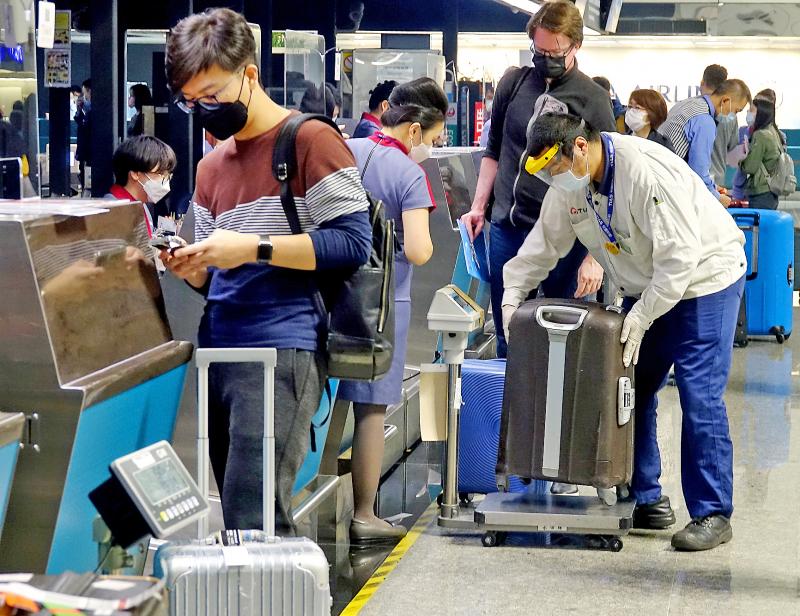EVA Airways Corp (長榮航空) yesterday announced that from June 23 it is to adopt a new baggage allowance policy for all passengers with a higher weight limit as it aims to benefit passengers and increase efficiency.
The airline currently has a two-system baggage policy: It allows passengers flying to the US and Canada to check in two pieces of baggage with a free weight allowance, while for those flying to Asia, Europe and Oceania there is also a free weight allowance, but no limit on the number of pieces of baggage.
From June 23, passengers would be able to check in two pieces of baggage, regardless of their destination, while the free weight allowance would be increased dramatically, EVA said.

Photo: Chu Pei-hsiung, Taipei Times
Currently, the maximum free weight allowance for baggage is set at 30kg for economy class passengers, but passengers under the new policy would be able to check in two pieces of baggage each with a maximum free weight allowance of 23kg, so the total maximum weight allowance would be raised to 46kg, the airline said.
For those with seats in premium economy, an intermediate class between economy and business class, the new free weight allowance would also be raised to 46kg from 35kg, EVA said.
Business-class passengers, or those flying in Royal Laurel class or Premium Laurel class, would be able to check in two pieces of baggage with a free weight allowance of 32kg per piece, a total maximum weight of 64kg compared with a current limit of 40kg, it said.
EVA also plans to offer cheaper tickets for those flying without heavy baggage, it said.
As a member of Star Alliance, the largest global airline grouping, the airline is changing its baggage policy to fall in line with other airlines in the alliance and to avoid confusing passengers, EVA president Clay Sun (孫嘉明) said.
With the new policy, it would be more convenient for passengers to connect with other airlines in the alliance, and EVA would be able to improve its airport and transit services by creating a smooth baggage-check and transfer process globally, Sun said.
China Airlines Ltd (中華航空) yesterday said that it has a two-system baggage policy: passengers flying to the US and Canada can check in two pieces of baggage, while it has a free weight allowance for the baggage of passengers flying to other destinations.
The airline has no plans to change its policy.
Tigerair Taiwan Ltd (台灣虎航), the nation’s only low-cost carrier, said that it charges different prices for different products, and products that include free baggage check-in and seat selection are more expensive than basic products.

Taiwan Semiconductor Manufacturing Co (TSMC, 台積電), the world’s biggest contract chipmaker, booked its first-ever profit from its Arizona subsidiary in the first half of this year, four years after operations began, a company financial statement showed. Wholly owned by TSMC, the Arizona unit contributed NT$4.52 billion (US$150.1 million) in net profit, compared with a loss of NT$4.34 billion a year earlier, the statement showed. The company attributed the turnaround to strong market demand and high factory utilization. The Arizona unit counts Apple Inc, Nvidia Corp and Advanced Micro Devices Inc among its major customers. The firm’s first fab in Arizona began high-volume production

VOTE OF CONFIDENCE: The Japanese company is adding Intel to an investment portfolio that includes artificial intelligence linchpins Nvidia Corp and TSMC Softbank Group Corp agreed to buy US$2 billion of Intel Corp stock, a surprise deal to shore up a struggling US name while boosting its own chip ambitions. The Japanese company, which is adding Intel to an investment portfolio that includes artificial intelligence (AI) linchpins Nvidia Corp and Taiwan Semiconductor Manufacturing Co (TSMC, 台積電), is to pay US$23 a share — a small discount to Intel’s last close. Shares of the US chipmaker, which would issue new stock to Softbank, surged more than 5 percent in after-hours trading. Softbank’s stock fell as much as 5.4 percent on Tuesday in Tokyo, its

COLLABORATION: Softbank would supply manufacturing gear to the factory, and a joint venture would make AI data center equipment, Young Liu said Hon Hai Precision Industry Co (鴻海精密) would operate a US factory owned by Softbank Group Corp, setting up what is in the running to be the first manufacturing site in the Japanese company’s US$500 billion Stargate venture with OpenAI and Oracle Corp. Softbank is acquiring Hon Hai’s electric-vehicle plant in Ohio, but the Taiwanese company would continue to run the complex after turning it into an artificial intelligence (AI) server production plant, Hon Hai chairman Young Liu (劉揚偉) said yesterday. Softbank would supply manufacturing gear to the factory, and a joint venture between the two companies would make AI data

The Taiwan Automation Intelligence and Robot Show, which is to be held from Wednesday to Saturday at the Taipei Nangang Exhibition Center, would showcase the latest in artificial intelligence (AI)-driven robotics and automation technologies, the organizer said yesterday. The event would highlight applications in smart manufacturing, as well as information and communications technology, the Taiwan Automation Intelligence and Robotics Association said. More than 1,000 companies are to display innovations in semiconductors, electromechanics, industrial automation and intelligent manufacturing, it said in a news release. Visitors can explore automated guided vehicles, 3D machine vision systems and AI-powered applications at the show, along